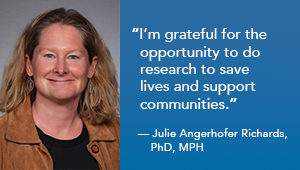Julie Richards, PhD, MPH
Biography
Julie Angerhofer, PhD, MPH, is passionate about improving care for mental health and substance use in partnership with people who provide and receive health care. She applies qualitative methods to inform what research questions we should be asking and how we should consider answering them. She employs statistical methods to inform implementation evaluations with a goal of optimizing care delivery and improving clinical practice effectiveness and patient outcomes.
Dr. Richards recently received grants from the Centers for Disease Control and Prevention and the American Foundation for Suicide Prevention to research firearm suicide prevention in health care systems via user-centered design and community-based participatory research. She also collaborates with multidisciplinary teams on a variety of mental health and addiction research projects, supports care delivery research partnerships, and mentors students at the University of Washington as an affiliate assistant professor.
Research interests and experience
-
Suicide Prevention
-
Alcohol and Drug Use
-
Behavior Change
Firearm injury prevention; alcohol and drug misuse; tobacco cessation
-
Mental Health
Depression; alcohol and drug use disorders; suicide prevention; self-management
-
Social Determinants of Health
Stigma
-
Health Services & Economics
Quality improvement, implementation cost
-
Preventive Medicine
Public and population health; screening effectiveness and uptake; evidence-based practice recommendations
-
Implementation Research
-
Addictions
Prevention and treatment
Sparc trial tools
Resources for behavioral health integration
The SPARC trial successfully implemented behavioral health care into primary care. On our website, you can access tools for behavioral health integration, as well as frequently asked questions and publications.
Recent publications
Lee AK, Bobb JF, Richards JE, Achtmeyer CE, Ludman E, Oliver M, Caldeiro RM, Parrish R, Lozano PM, Lapham GT, Williams EC, Glass JE, Bradley KA. Integrating alcohol-related prevention and treatment into primary care: A cluster randomized implementation trial. JAMA Intern Med. 2023 Apr 1;183(4):e227083. doi: 10.1001/jamainternmed.2022.7083. PubMed
Yarborough BJH, Stumbo SP, Schneider J, Richards JE, Hooker SA, Rossom R. Clinical implementation of suicide risk prediction models in healthcare: A qualitative study. BMC Psychiatry. 2022 Dec 14;22(1):789. doi: 10.1186/s12888-022-04400-5. PubMed
Richards JE, Yarborough BJH, Holden E, Shulman L, Stumbo SP, Coley Y, Simon GE. Implementation of suicide risk estimation analytics to support mental health care for quality improvement. JAMA Netw Open. 2022 Dec 1;5(12):e2247195. doi: 10.1001/jamanetworkopen.2022.47195. PubMed
Richards JE, Kuo ES, Whiteside U, Shulman L, Betz ME, Parrish R, Boggs JM, Rowhani-Rahbar A, Simon GE. Patient and clinician perspectives of a standardized question about firearm access to support suicide prevention: a qualitative study. JAMA Health Forum. 2022 Nov 4;3(11):e224252. doi: 10.1001/jamahealthforum.2022.4252. PubMed
Cruz M, Shortreed SM, Richards JE, Coley RY, Yarborough BJ, Walker RL, Johnson E, Ahmedani BK, Rossom R, Coleman KJ, Boggs JM, Beck AL, Simon GE. Machine learning prediction of suicide risk does not identify patients without traditional risk factors. J Clin Psychiatry. 2022 Aug 31;83(5):21m14178. doi: 10.4088/JCP.21m14178. PubMed
Research

Suicide attempts decreased after adding suicide care to primary care
Safety planning and risk screening improved outcomes for adult patients.
Research

Understanding adoption of Lock to Live, a decision aid supporting suicide prevention
KPWHRI research finds ways to increase use of a firearm safety tool.
News

Kaiser Permanente expands gun violence prevention work
Equity-focused research by Julie Angerhofer Richards, PhD, MPH, is among the work supported by $3.2 million.
KPWHRI in the media
Suicide care in primary care reduces suicide attempts
Primary care intervention might reduce suicide attempts
MedPage Today, Sept. 30, 2024



